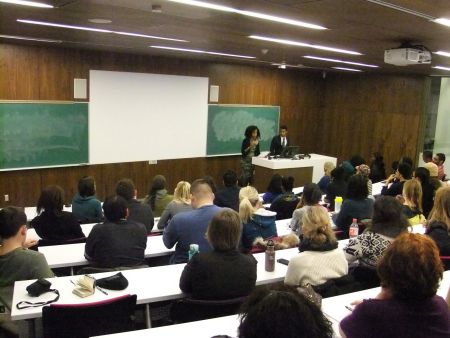On Nov. 9, the Black Law Students’ Association (BLSA) at the University of Ottawa organized a press conference to speak out against a racist epithet scrawled on a Law Department bathroom wall.
BLSA President Christien Levien called for the development of mandatory anti-discrimination training as well as changes to the Equity Committee such that students could bring grievances to a committee of peers that would make decisions and recommendations.
The BLSA issued a press release in the lead-up to the event that read, “this event is related to a variety of comments, memes and online conversations that have threatened the mental and emotional sanctity of racialized students, specifically Black law students, here at the Faculty of Law over this academic term.”
“I’m here with you today because Black students and our colleagues were devastated when somebody decided to carve the N-word in a bathroom here on our campus,” Levien told the audience. “The hate crime was reflective of a broader, much more complex institutional and societal problem.”
According to Saron Gebresellassi, law student and event emcee, “This is not an isolated incident and is part of a broader problem and a broader pattern of systemic discrimination and racial tension that has been brewing over the past term and dare I say over the past couple of years.”
The reaction by the BLSA and its allies was met with both accusations that they were overblowing the significance of the incident, and denial that it is part of a larger problem of systemic discrimination experienced by people of colour in educational institutions and across Canadian society more generally.
“We have students amongst us who are actually denying the validity of this expression,” said Law Professor Joanne St. Lewis, referring to critics of the BLSA’s response. “What does it mean to be training you to engage in justice if you do not understand what it actually fundamentally means at the basic level of your social interactions,” said St. Lewis, the first and only Black woman to be elected as a bencher of the Law Society of Upper Canada.
“Shame on the students who refuse to acknowledge their white privilege and who refuse to listen to racialized students,” said Law Professor Suzanne Bouclin. “Shame on the white students who are making this about them — get over yourselves.”
Lavina Latham, president of the Black Law Students’ Association of Canada, described the N-word as “hateful,” “hurtful,” and “enraging.” She said that some members of the legal community and others “have consciously decided to use the N-word under the umbrella of justification that Black people say it so why can’t I.”
“I’ll tell you why,” she said. “It is a derogatory term laced with disrespect that is meant to completely exert power and control over another individual. It serves as a constant reminder of the inferiority we experience as a result of the historical enslavement and disenfranchisement of African people across the globe.”
“That word is a word that just slices through my flesh to my bone,” said St. Lewis. “It is not a word I created for myself, it’s a word that means that we have no value at all.”
There were also concerns after the incident that the university would shirk responsibility. “Some of us were admittedly concerned that our administration may try to silence us and try to sweep this under the rug for fear of bad press or bad publicity,” said Gebresellassi. However, “We’re glad to find that this has actually not been the case.”
President and Vice-Chancellor Allan Rock met with members of the BLSA during the week leading up to the event and both he and Common Law Dean Bruce Feldthusen have taken a strong stance against this incident, according to Gebresellassi, who vowed that students will hold them to their word.
Also addressing concerns that the reaction was shining a negative spotlight on the department and the university, St. Lewis responded, “I am not naive about the range of problems here but we are a faculty that’s committed to social justice.”
“I’m not rebranding our school as if we launder sheets for the KKK on the weekend.”
According to former BLSA President Farida Adam, “Regardless of your gender, race, class, or sexual orientation, you have a right to walk through the halls of Fauteux and be free from rude comments, racialized comments, or homophobic comments.”
“That’s not a radical statement to make,” she said.
A number of groups have pledged their support for the BLSA, including the Asian, Muslim, Latin American, and Aboriginal Law Students’ Associations, as well as the undergraduate and graduate student unions, CUPE 2626, and the Ontario Public Interest Research Group - Ottawa (OPIRG-Ottawa).
